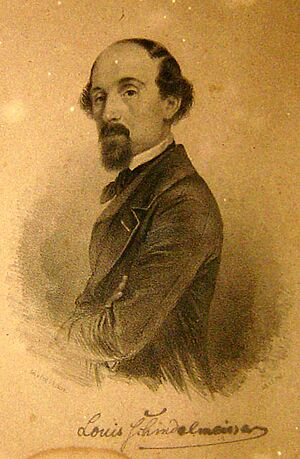Louis Schindelmeisser facts for kids
Louis Schindelmeisser (born December 8, 1811, died March 30, 1864) was a German musician from the 1800s. He was a skilled clarinetist, a leader of orchestras (called a conductor), and someone who wrote music (a composer).
Louis was born in Königsberg, a city in Prussia. He studied music in big cities like Berlin and Leipzig. He was a big fan of the famous composer Richard Wagner. Louis even helped put on some of Wagner's first operas in places like Wiesbaden and Darmstadt. He conducted the very first show of Wagner's opera Tannhäuser, and also helped with Rienzi and Lohengrin.
Life of a Musician
Louis Schindelmeisser went to a special high school for music in Berlin. There, he learned to play the clarinet from a very talented French musician named J. M. Hostié. It's possible he even started learning from Hostié earlier in Königsberg. Louis Schindelmeisser passed away in Darmstadt.
He wrote his own operas, which were similar to the works of other famous composers like von Weber and Spohr. People said his music balanced beautiful singing parts with exciting story parts. One of his most interesting pieces is his Sinfonia Concertante Op. 2. He wrote it in 1833 for four clarinets and an orchestra. It's thought to be the only piece of its kind!
His Music
Louis Schindelmeisser wrote many different types of music. He created pieces for wind instruments and several operas.
Music for Wind Instruments
- Ouvertüre zu dem Trauerspiel "Uriel Acosta" for Harmoniemusik (a type of wind band).
- Sinfonia Concertante op.2 for four clarinets and orchestra. This piece is very special because it's rare to find a concerto written for so many clarinets!
- Concertino in E flat which he dedicated to his clarinet teacher, J. M. Hostié.
Operas and Stage Works
Louis Schindelmeisser wrote many operas, which are plays set to music. Some of his notable works include:
- Peter von Szapáry, first performed in Pest in 1839.
- Malwina, a romantic opera that premiered in Pest in 1841.
- Der Rächer (The Avenger), a heroic opera based on a famous French play. It was first shown in Pest in 1846.
- Melusine, another romantic opera, which premiered in Darmstadt in 1861.
 | Laphonza Butler |
 | Daisy Bates |
 | Elizabeth Piper Ensley |


